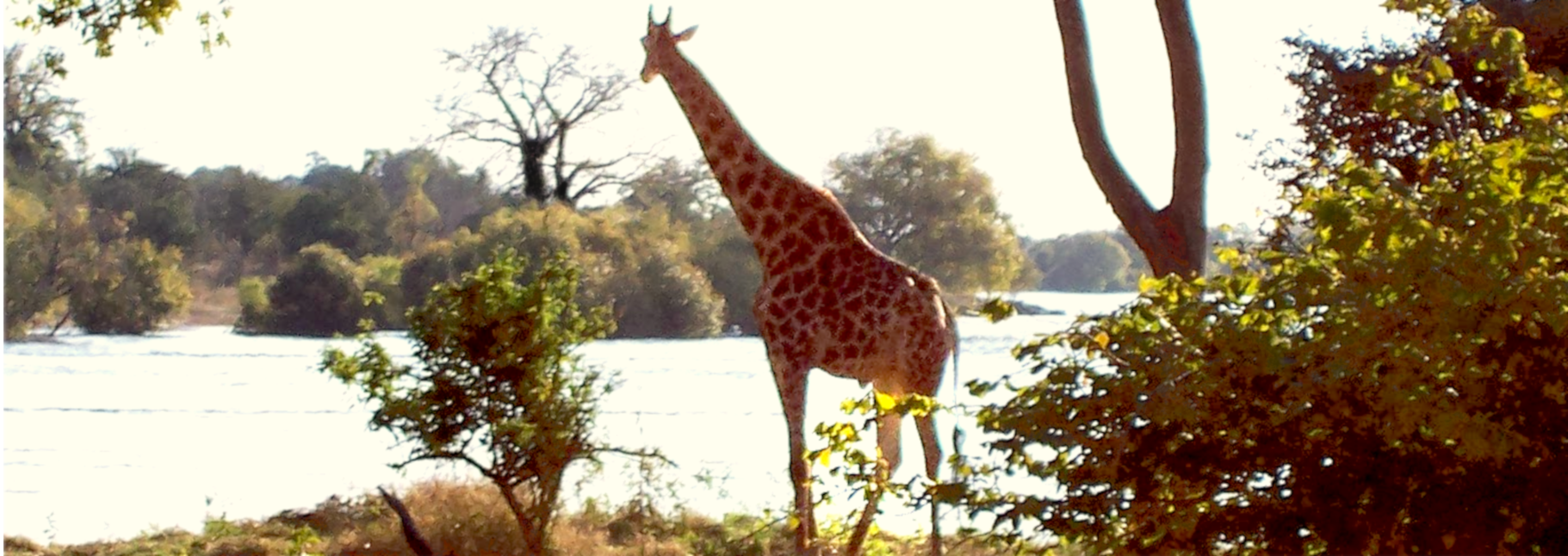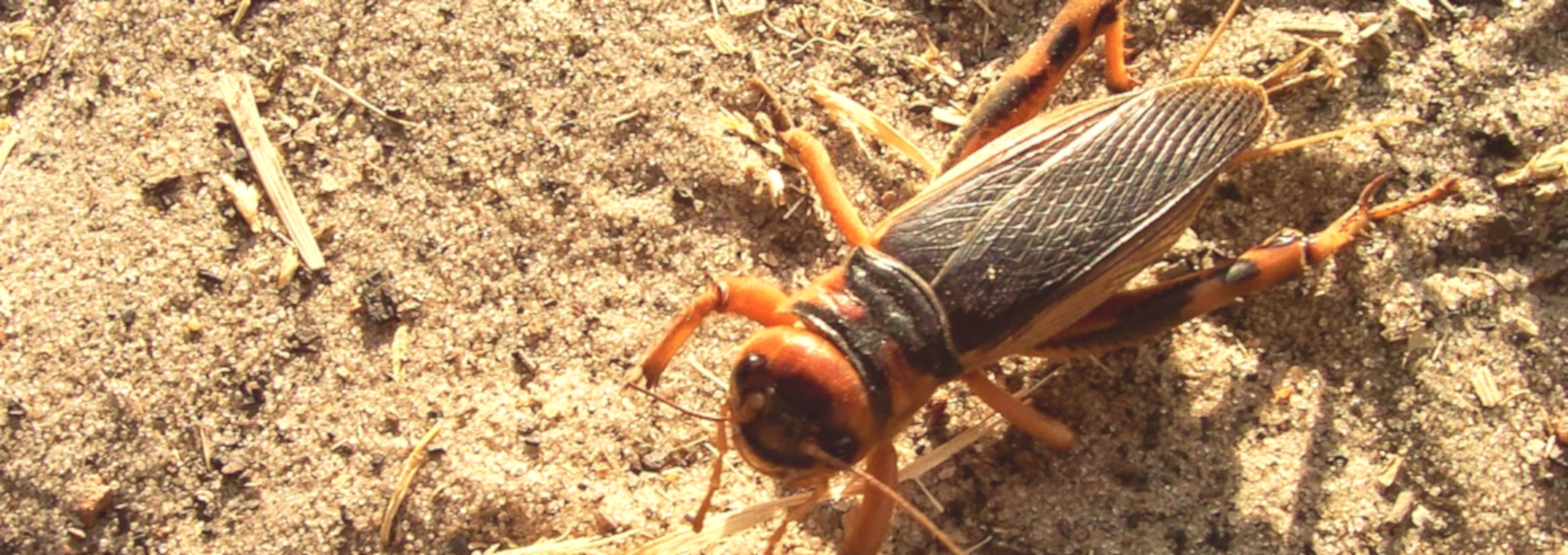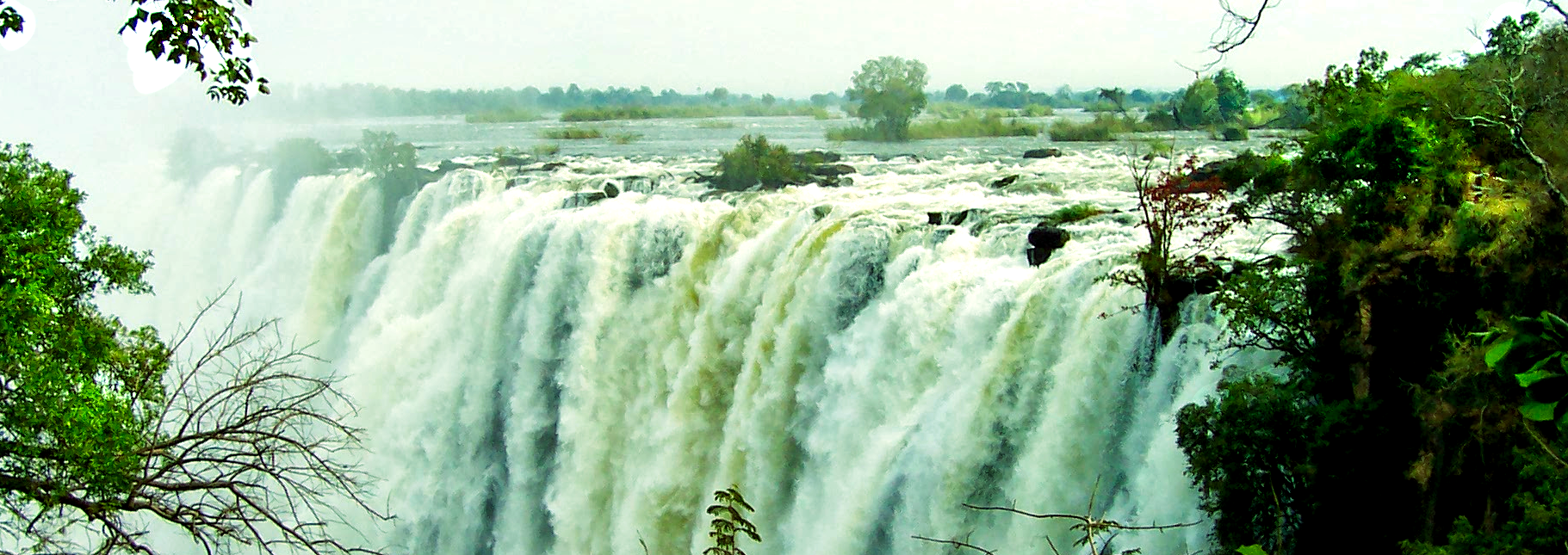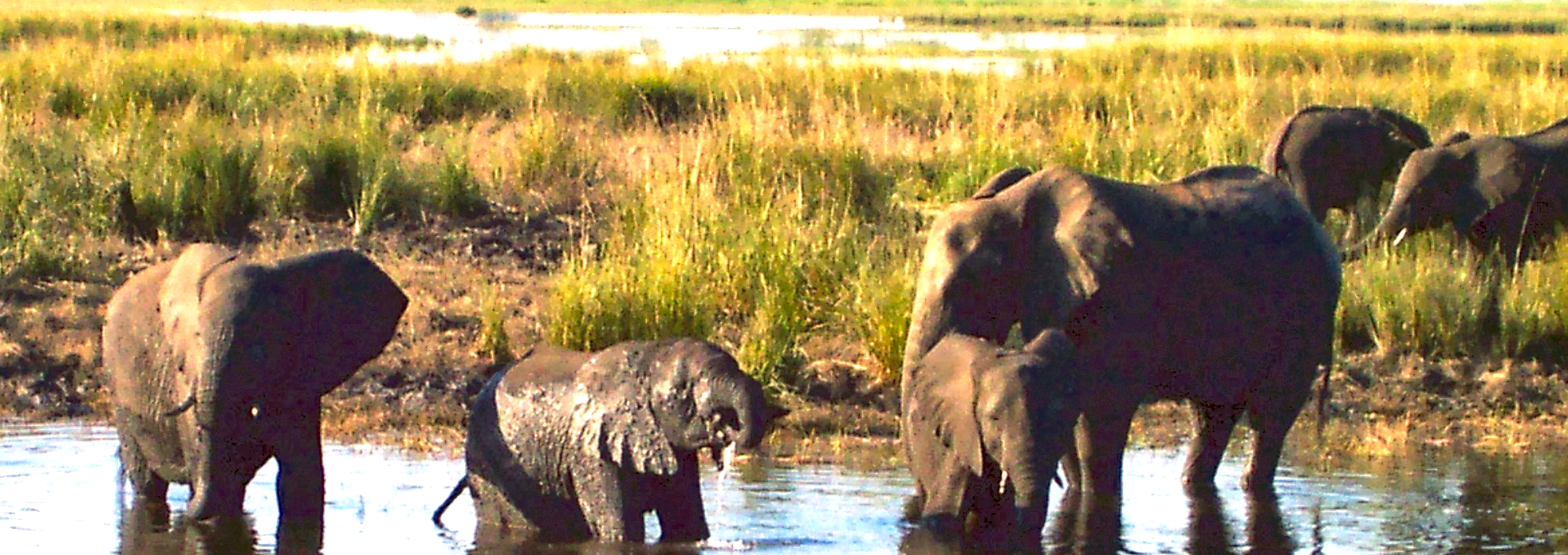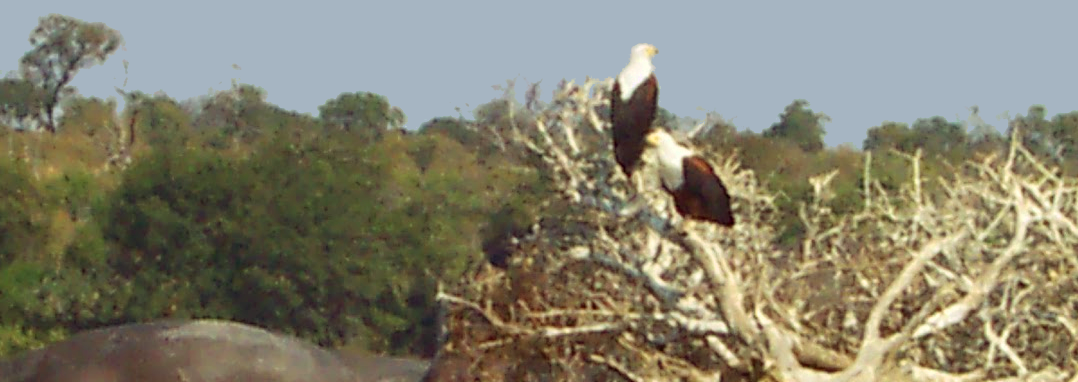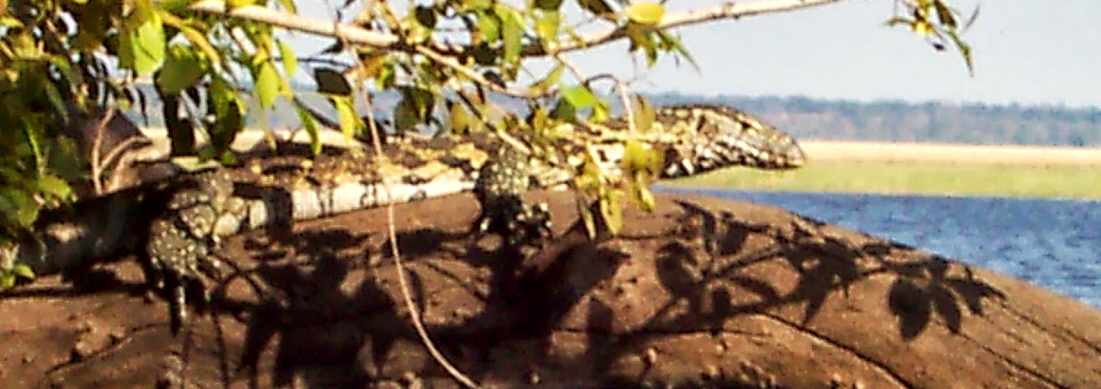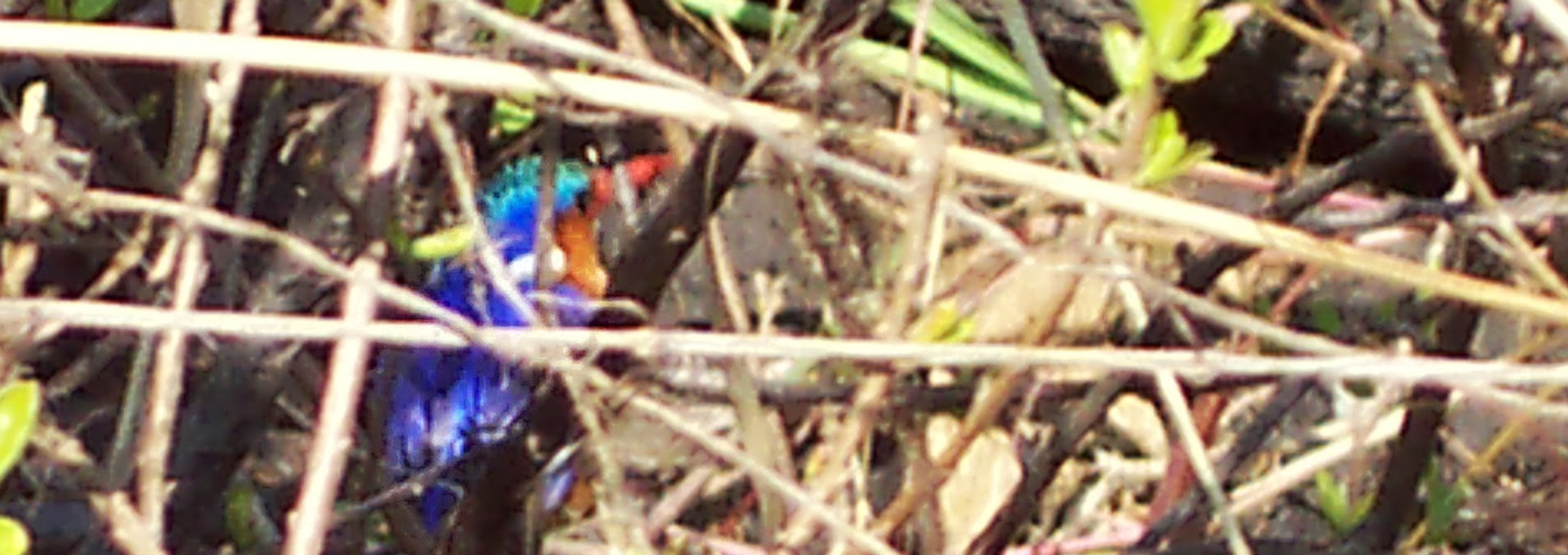Every Living Creature: God’s Design for Animals
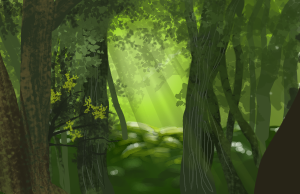
This is the main information site for a class for adult members and friends of the First Presbyterian Church of Sarasota, Florida on animals in God’s plan.
The class asked fundamental questions such as,
- Why did God create animals in the first place?
- What did God intended for them?
- What is the destiny of the animals?
- Are animals ‘saved?
- Do they share with humans an afterlife?
- If God created, sustains, and brings animals to perfection, will God also bring the entire created world into perfection?
- Will an original beauty, truth, and goodness be restored for all things?
These questions may sound strange to church attenders and people with a devotion to biblical Christianity. After all, we haven’t really spent time in Church discussing these ideas. They may sound childish, frivolous, or exotic. They may sound like a distraction from what has become the Church’s core task of helping people to overcome their sin problem in order to enjoy an new relationship with God the Father through the life and death of Jesus Christ.
Despite the frivolous sound of a theological consideration of animals, it is significant that several academic theologians are beginning to think freshly about all living creatures as players in God’s plan. This class will draw on their work and set before the participants the neglected biblical evidence that God’s intention is to preserve all things bringing them to perfection and a joyous, harmonious existence.
I’m a Minister Who Has Ignored Animals
When I entered parish ministry in the late 1970’s it never occurred to me that animals had an important place in God’s eyes. Weekly, I read and preached from the Bible. But I never noticed that animals, and the whole world for that matter, was part of the scope of redemption.
I remember watching a stand-up comedian who told an astute joke from the book of Genesis. The joke was simply this. Adam is complaining to God. “Lord, these animals are great, and I hate to complain, but…well…where are the girls?” I think the joke is astute because it recalls that God created the animals for Adam’s aloneness before God created the woman. The comedian was aware that God created animals as the first provision for Adam’s loneliness. We tend not to remember that original purpose for other living creatures. Only later did the Creator divide the first human to make him? it? them? in to two sexes.
Nowadays, these details in the Book of Genesis feel quaint. Congregations are busy with the New Testament and politics and keeping the church intact.
Creation Suddenly Seems Important
Two recent developments have forced me to reconsider animals as important in God’s plan for the world. More broadly, I’m fascinated with the Christian attitude towards creation. As it turns out a growing number of church leaders and theologians are having the same concern. Two reasons come to mind:
First, animals are in big trouble.
The human animal and its domesticated food stocks have had an extensive impact on the Earth’s ability to support life, which has resulted in the rapid collapse of the entire wild animal kingdom. The aggregated weight of all the chickens being raised for human consumption is now roughly equal to the aggregated weight of all other birds. Similar weight comparisons show a dramatic rise in animal food animals and a plunging decline in all other animals. Biologists report grim statistics of shrinking habitats and declining numbers, and the outright extinction of many wild animals.
Second, theologians have turned their interest to a subject that I’ll call the “scope of redemption.”
Christianity has long put forth an unexamined and often unspoken impression that only certain favored people are in the circle of God’s love and destined for eternal life. The doctrine of election, which flows from God’s seeming favoritism of Sematic peoples, Augustine’s teaching on predestination, and Calvinism’s harsh invention of double predestination, gives an impression that, beyond a collection of elite believers, all others and presumably the rest of Creation will be lost.
This limited circle of those in God’s favor is now widening. It’s widening as we read the Bible with more perception and in the shadow of the threat of Climate Change. Universalism, the idea that God will bring all persons into healing and everlasting life, is gaining popularity. So also is the idea of the restoration of all Creation.
It’s unnerving to write this.
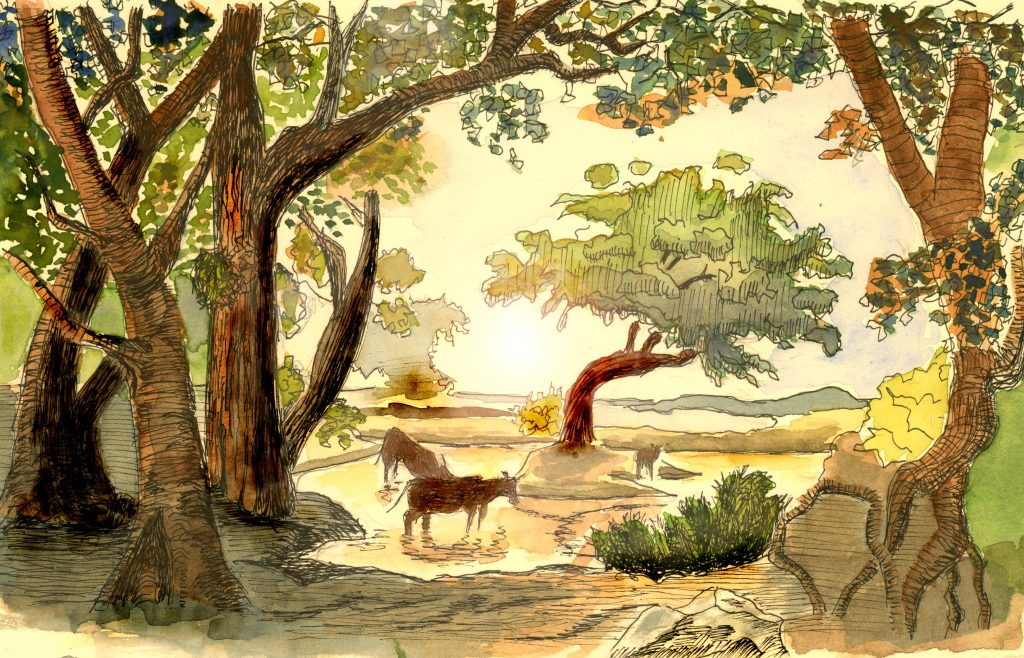
I preached weekly for 4 decades and only spoke clearly about the coming redemption of all things in the final couple of years of my active ministry. I managed to miss the many biblical verses like Ephesians 1.10 (he has made known to us the mystery of his will, according to his good pleasure that he set forth in Christ, 10as a plan for the fullness of time, to gather up all things in him, things in heaven and things on earth. ), which refer to salvation’s cosmic scope.
Animals, of course, are a part of the cosmic scope of salvation. In Genesis’ first chapters animals are created with a special vocation to be companions to humanity. Importantly, Noah rescues breeding pairs of all animal species on the Ark. There appears an unspoken equivalence between animals and humans on the Ark, all of whom will be the basis for filling the earth with their offspring. From the Bible’s first words is the clear affirmation that animals are important.
The Class
Even though the crisis with animals is a current emergency, the Christian response is rooted in its timeless and core doctrines, namely, Creation and Redemption. In our class, we will ask momentous questions and listen again for what the Bible and tradition are saying to us. Why, for example, did God create all things? What is his ultimate plan for animals, human and non-human? Are animals be saved? What is the destiny of all things?
Thinking about animals theologically may seem like a novelty subject, far out on the outer edges of core faith concerns. Ironically, study of animals plunges us into mega-themes in our faith. We can’t think about animals without thinking about ourselves in God’s plan. Thinking about the destiny of all life sheds light on our personal ethics and the mission of the church. Facing the way that we threaten all living things raises the question of how God takes care of Creation. And one factor that I never thought of before delving deeper into the vocation of animals is the central role of the Cross of Christ. Does the cross only solve our sin problem, or does it facilitate the restoration of all things? There’s a wonderful answer to this question.
How we should behave towards animals in our day to day lives today is just as important as studying them in an adult class. If animals have a relationship with God and are part of the Kingdom of God, how should we treat them today? What might God be thinking about all of the land space dedicated to beef, pork, and chicken production? Is it ethical to keep pets? Hunt? Wear fur? Employ animals to do work? Our class will devote time to these questions.
All members and friends of First Presbyterian Church, Sarasota are invited to participate in the class. All materials used in the class will be available for review and download. Part of my motivation for organizing this class is to prompt Christians to address climate change and its impact on all animal life. Anyone wishing to teach about this or related topics is welcome to use any of the graphics or information offered here.
The Schedule
| Every Living Creature: God’s Design for Animals | ||
| Class | Class Topic | Resources |
| 1 | The Anthropocene | Video and Resources |
| 2 | The Paleolithic: The Dawn of Human Consciousness–Hal Serrie | Video and Resources |
| 3 | Creation: Why Did God Create Animals in the First Place? | Video and Resources |
| 4 | Creation II: Why Did God Create Animals in the First Place? | Video and Resources |
| 5 | The Fateful Transition–Hal Serrie | Video and Resources |
| 6 | Redemption and Recapitulation | |
| 7 | God’s Oneness with a Suffering Planet | Video and Resources |
| 8 | Toward a Biblical Ethic of Animal Well Being | Video and Resources |
Resources:
| Author | Title | Publisher | Date |
| Johnson, Elizabeth | Ask the Beasts: Darwin and the God of Love | Bloomsbury Continium | 2015 |
| Clough, David | On Animals (Vol. 1 and 2) | T and T Clark | 2019 |
| Hart, David Bently | That All Shall Be Saved: Heaven, Hell, and Universal Salvation | Yale University Press | 2019 |
| Johnson, Elizabeth | Creation and the Cross: The Mercy of God for a Planet in Peril | Orbis | 2019 |
| Steck, Christopher | All God”s Animals: A Catholic Theological Framework for Animal Ethics | Georgetown University Press | 2019 |
| Edwards, Denis | Deep Incarnation: God’s Redemptive Suffering With Creatures | Orbis | 2019 |
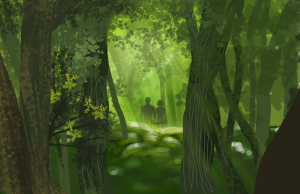
Class Publicity and Graphics
Class Description for Announcements
Most of us who have had pets understand intuitively that animals are wonderfully noble and have a capacity to love that only can come from God. Sadly, we never hear much in church about animals. why God created them or what God intends for them. Full disclosure—I don’t recall preaching or teaching about animals in my years as a minister. Because of this silence, we’re left with an impression that God is interested only in the condition of our individual souls. And we have little idea about peoples who practice other religions or the rest of the vast living world, which appears outside of God’s concern.
This neglect is giving way to a fresh appreciation that the scope of grace is vaster and more creative than we’ve been thinking. In the last five years, Catholic, Protestant and Orthodox scholars have begun to reclaim the biblical vision for God’s care and perfection of all things. Bible verses such as Colossians 1. 15-20, which speak of God’s interest in all things, in fact abound in the Old and New Testament.
Our class, “Every Living Creature: God’s Design for Animals,” will introduce participants to this thinking and to a thread that runs through the Bible and Church History, which holds that everything God created will be redeemed and brought into glory.
As a bonus, the class will have a scientific element. Hal Serrie, a First Presbyterian member, and academic anthropologist will teach two of the classes. Hal will orient us to the relationship between traditional peoples and animals.
Because this class covers unfamiliar ground, it will open our thinking to issues that we may have thought to be settled. For example, how does Jesus’ cross extend new life to the non-human world? What about hell and eternal suffering? Is it ethical to eat animals? What are we to think of the Climate Crisis in view of the glorious prospect that God is restoring all things?
The old gospel hymn turns out to be a perfect summation of what our class will explore:
For the love of God is broader
Than the measures of the mind,
And the heart of the Eternal
Is most wonderfully kind.
All members and friends of First Presbyterian Church are welcome to participate and utilize class materials found here.
Doug DeCelle
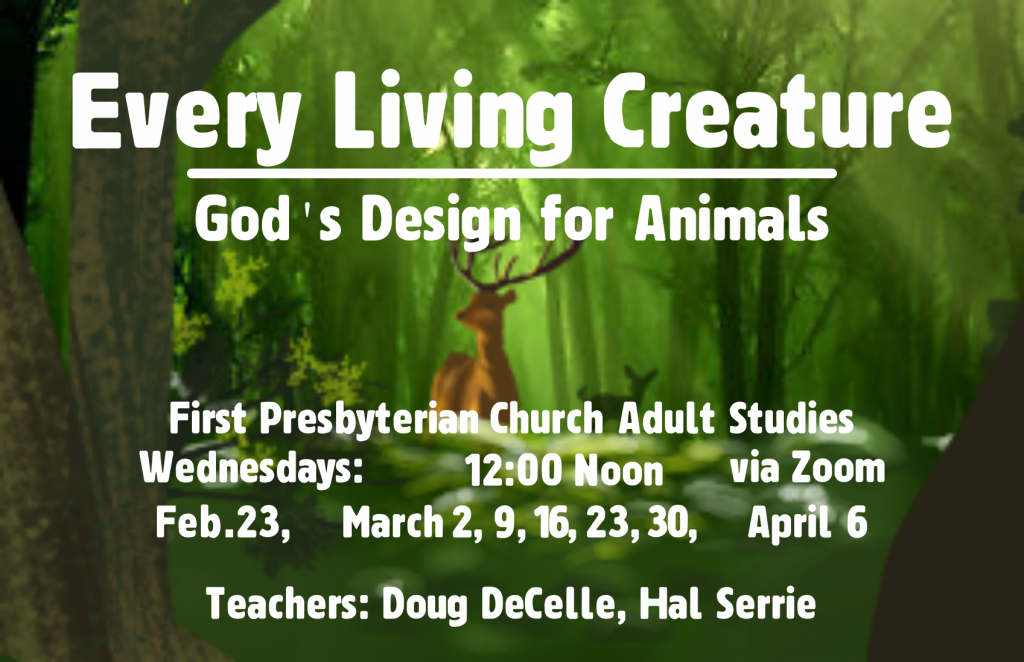
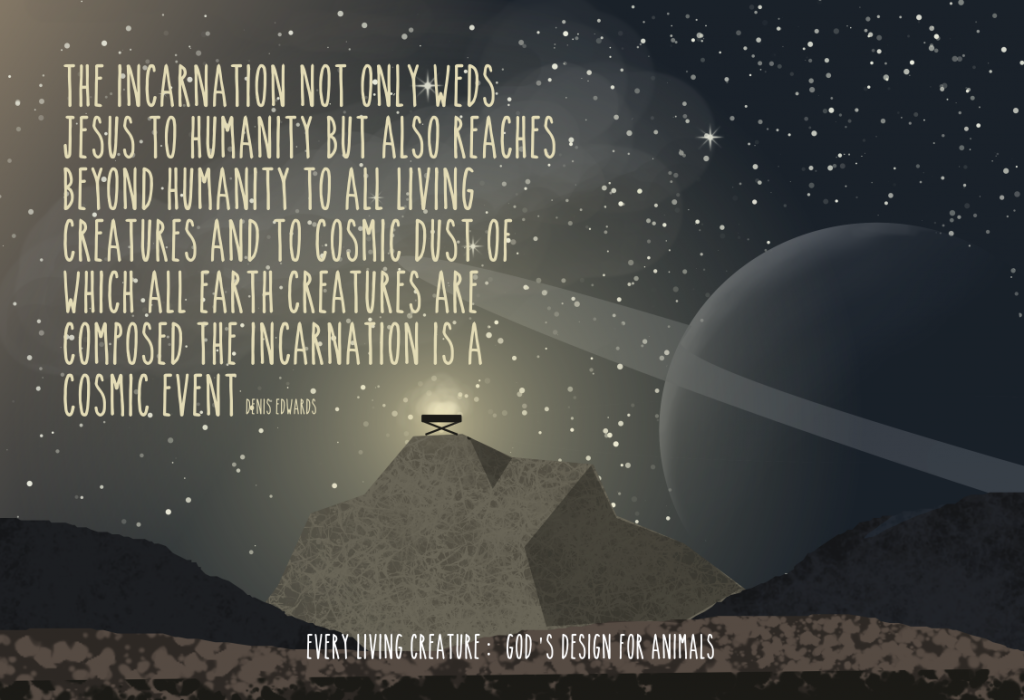
Animal Photographs by Kristen Ojo

